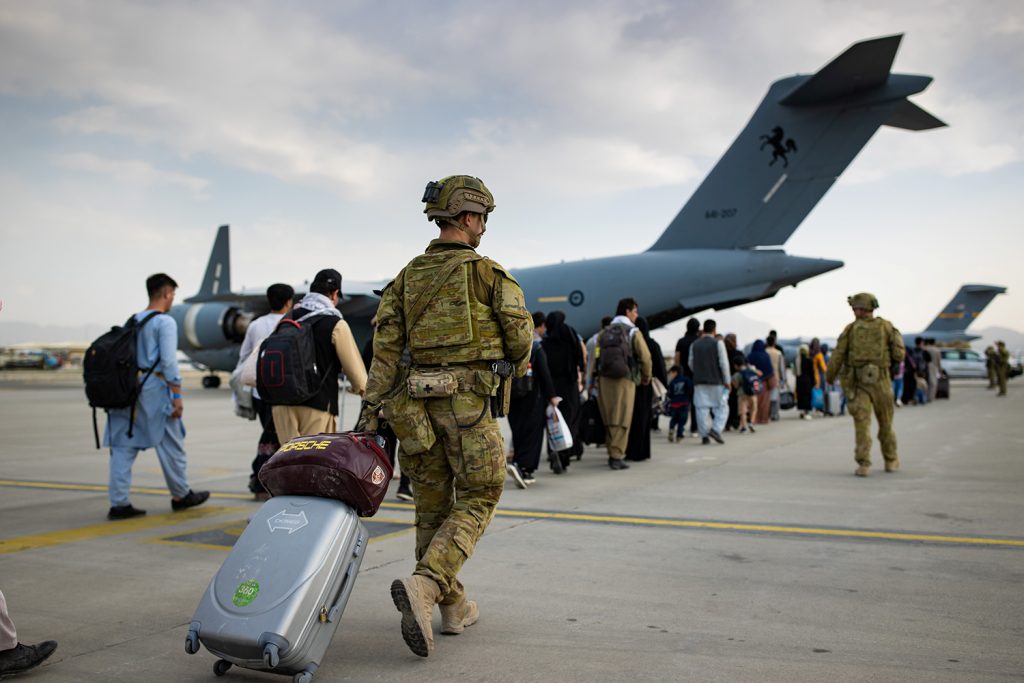On August 30, 2021, the United States officially withdrew troops from Afghanistan. This departure ended a 20 year “war” and left the country, as it found it, in the hands of the Taliban. In the weeks leading up to the scheduled withdrawal negotiated by the Trump administration, a massive, rapidly progressing humanitarian crisis developed with hundreds of thousands of people displaced from their homes, on the run, and attempting to leave the country. They were women and children, translators, government officials, schoolteachers, civil servants, clerks in NGOs, members of the Afghan military, shopkeepers—any and all who felt targeted and threatened by the Taliban.
After the tragic 9/11 attacks in 2001, President George W. Bush began the American mission in Afghanistan. The U.S attacked Al Qaeda, the terrorist group responsible for 9/11 and their patrons, the Taliban, a conservative Islamist military force with control over much of Afghanistan. In the years after Afghanistan’s war with the Soviet Union, the Taliban, through muscle and guns, had battered most rival groups out of existence. On the eve of 9/11 its chief rival was the Northern Alliance under Massoud. In the hours before the attack on the Twin Towers, Massoud was assassinated by the Taliban
President Bush initially intended for the Afghan war to eliminate Al Qaeda and remove the Taliban and their ability to support terrorist groups. But early in the war, he stated that “it will not end until every terrorist group of global reach has been found, stopped and defeated.”
Initially, with the removal of the Taliban from power, some welcome progress came to Afghanistan. For example, women were gaining rights that they did not have when the Taliban was in control. Eventually, however, the war slowed down with less of a discernible strategy. The U.S. was spending trillions of dollars on supporting the war, thousands of lives were lost and little progress was being made.
During his term, President Trump declared his intention to fully withdraw from Afghanistan in 2020. For a variety of reasons, he never followed through on this plan. In one of their few areas of agreement, President Biden announced his intention to complete the withdrawal. By August 2021, President Biden was ready to set a deadline. As U.S. troops went home, Afghanistan’s weak government unraveled and their military forces (including the president) deserted in large numbers as more and more of the country fell to the Taliban.
When the Taliban was in control of Afghanistan during the late 1990s. It ruled the country with inhumane, violent and antiquated ideals. Many of its harshest regulations were targeted towards women and girls. Some of them included not allowing women to attend school, confining women to their home unless they were accompanied by a male relative and women were required to wear burqas, a traditional garment, when leaving the home.
As the Taliban regains power, women and girls, as well as women’s rights advocates, are concerned about the likely return of these harsh regulations.
Alejandra Chavez-Flores (V) sympathizes with the women of Afghanistan. “The Taliban takeover has been difficult for me to watch. I’ve been consistent in reading and watching the news regarding the situation and a level of fear washes over me each time, a fear for the women. Those women fought so hard for all their rights and at the snap of a finger it was all lost,” she wrote.
Others worry that the Taliban will attack Afghan citizens who helped American forces throughout the war.
Fear of the Taliban has prompted numerous Afghans to make an effort to flee the country. Some citizens even clung to the U.S. Air Force jets in hopeless and tragic attempts to cross country borders. However, Kabul’s international airport closed after the final U.S. troops headed home, effectively terminating the plans of many civilians who had been trying to escape quickly. Due to the need to allow some American troops who had been left behind after the withdrawal to return home, the airport reopened.
President Biden has been heavily criticized for the nature of this quick retreat. Many place the blame for the evolving humanitarian crisis on him. In an NPR/PBS Newshour/Marist poll, his approval rating dropped six percentage points from July to post-retreat and it is now at 43%. Despite these criticisms, Biden defended his choice to withdraw. He stated “After 20 years, I’ve learned the hard way that there was never a good time to withdraw US forces.”
He did, however, admit that the situation unraveled more quickly than he had expected.






